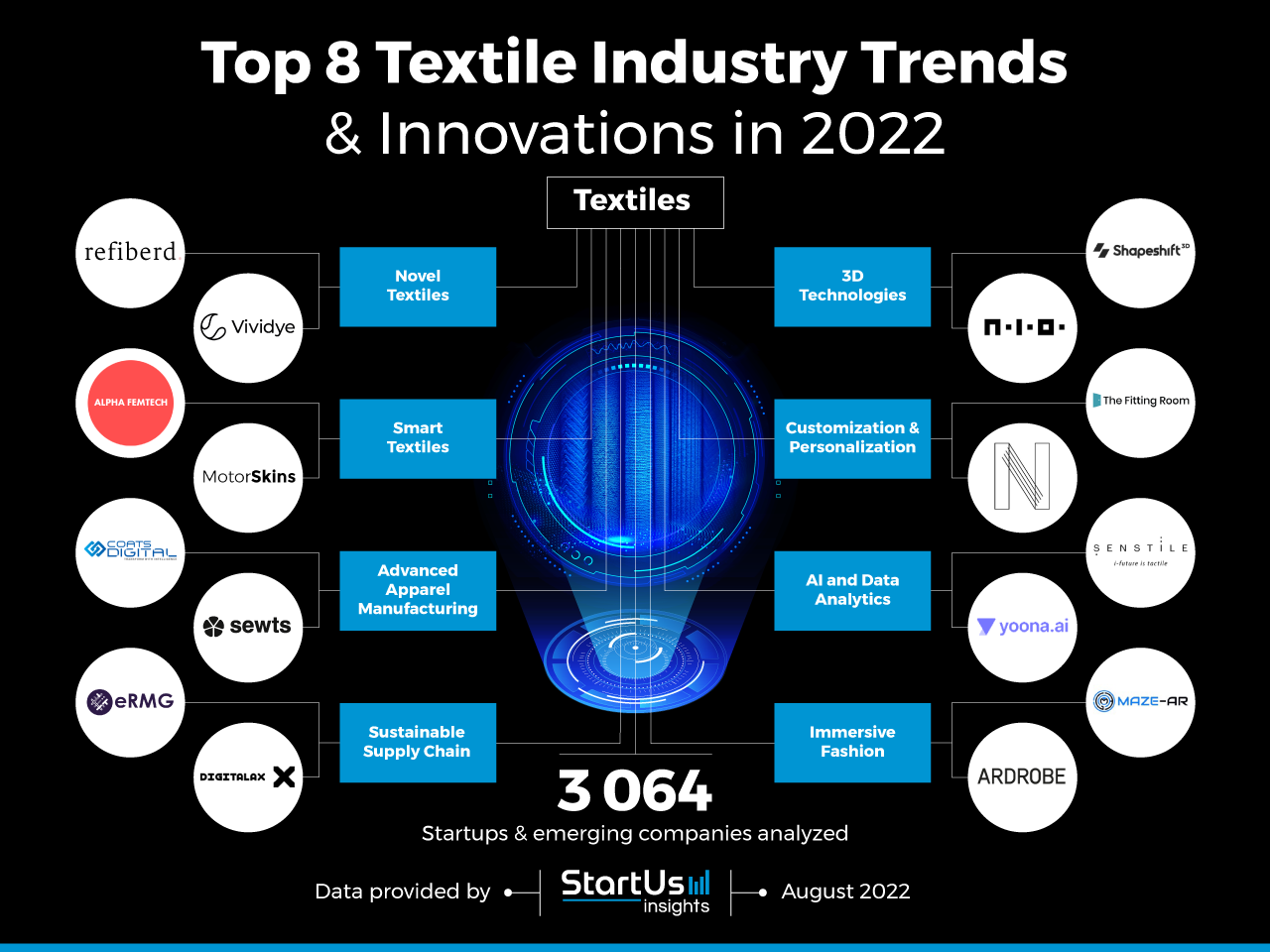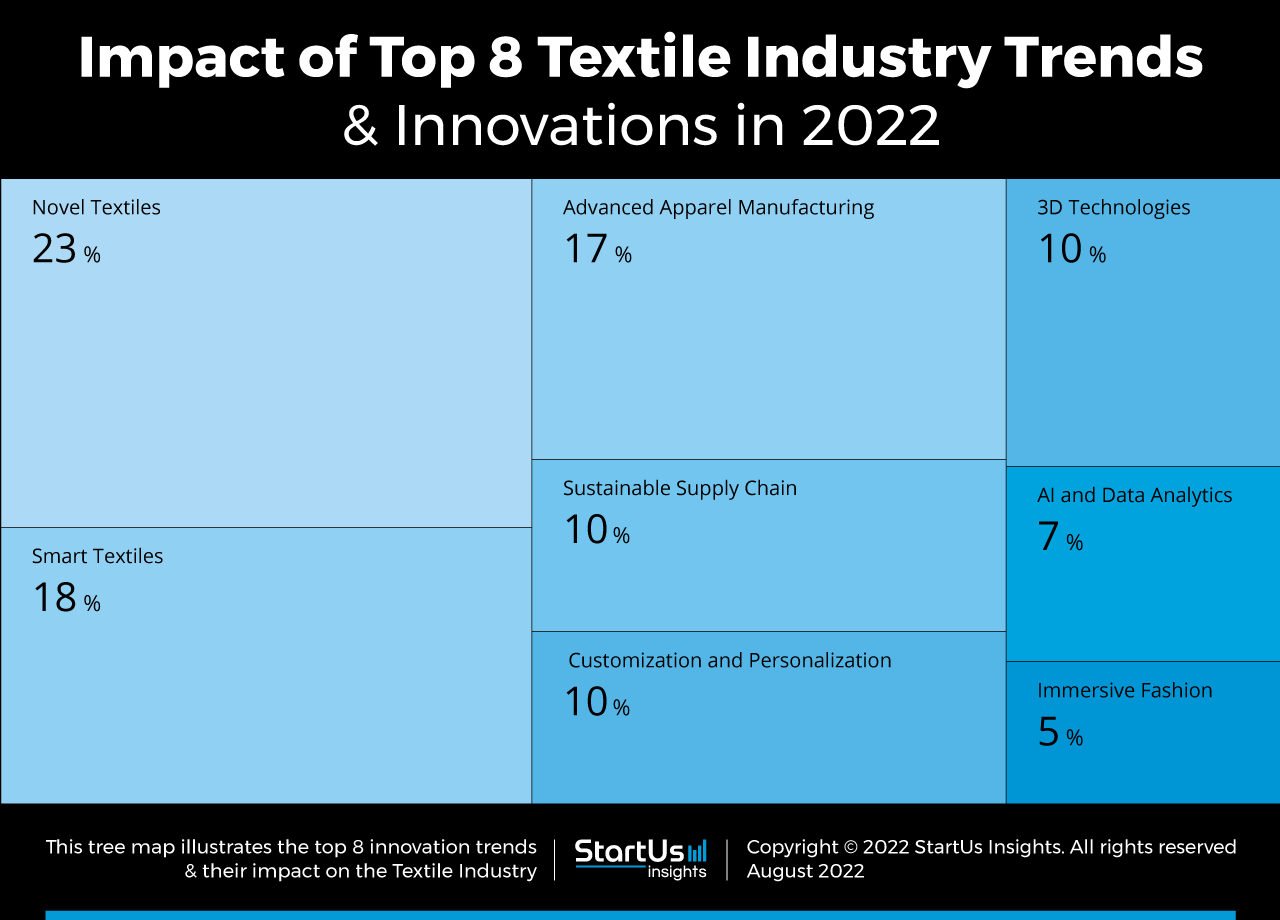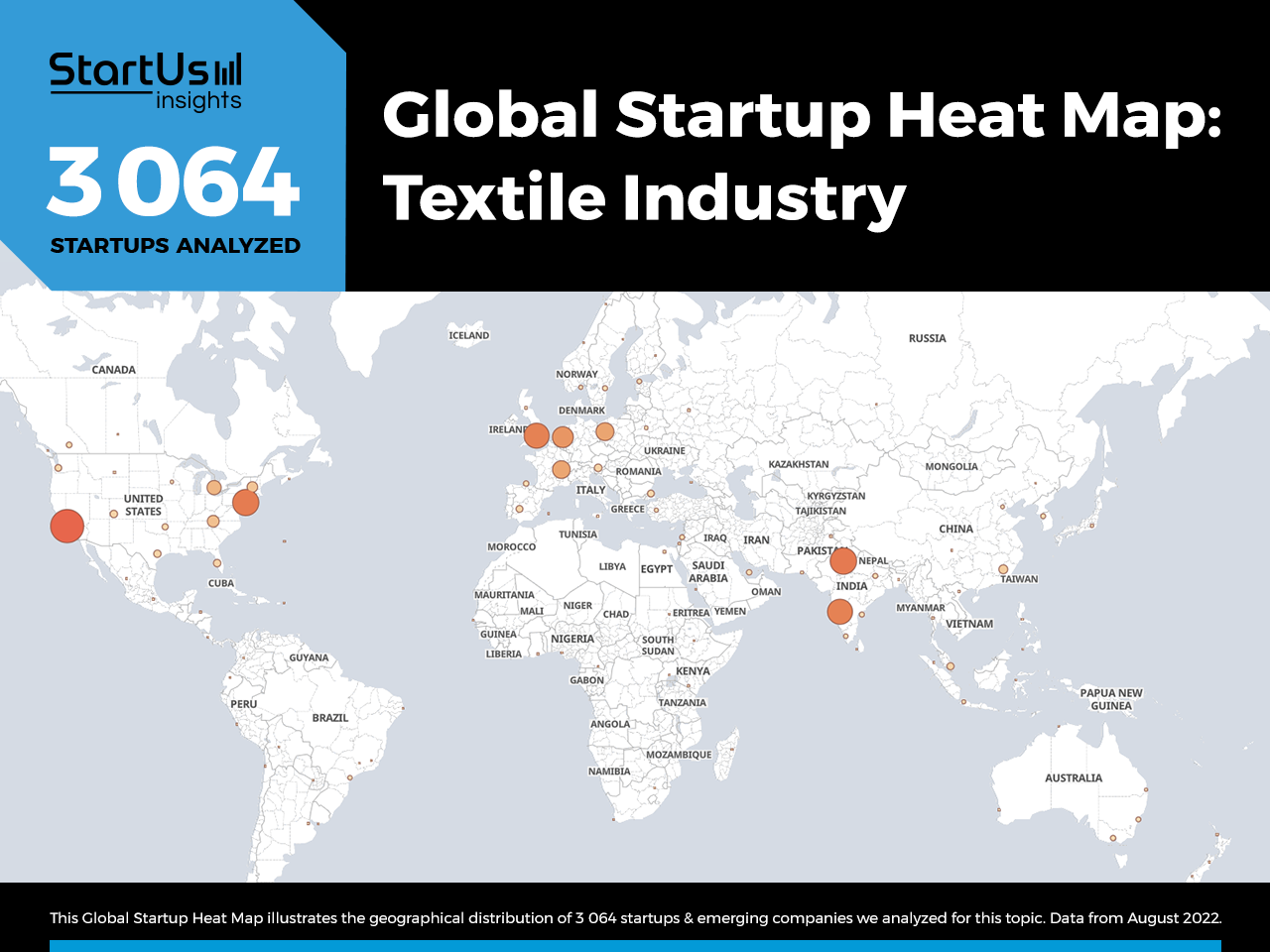Accelerate Productivity in 2025
Reignite Growth Despite the Global Slowdown
The textile industry faces issues like water and air contamination, greenhouse gases, and chemical discharge. Key trends include novel fabrics and advanced manufacturing technologies, with digitalization utilizing IoT, AI, data analytics, and 3D tech for better performance and sustainability. To stay competitive, startups focus on innovative marketing concepts, including immersive fashion, gamification, and personalized user-centric services.
This article was last updated in July 2024.
Top 8 Trends in the Textile Industry (2025)
- Novel Textiles
- Smart Textiles
- Advanced Apparel Manufacturing
- Sustainable Supply Chain
- Customization and Personalization
- 3D Technologies
- AI and Data Analytics
- Immersive Fashion
Innovation Map outlines the Top 8 Textile Industry Trends & 16 Promising Startups
For this in-depth research on the Top Textile Trends and startups, we analyzed a sample of 3064 global startups & scaleups. This data-driven research provides innovation intelligence that helps you improve strategic decision-making by giving you an overview of emerging technologies in the textile industry. In the Textiles Innovation Map below, you get a comprehensive overview of the innovation trends & startups that impact your company.
These insights are derived by working with our Big Data & Artificial Intelligence-powered StartUs Insights Discovery Platform, covering 4.7M+ startups & scaleups globally. As the world’s largest resource for data on emerging companies, the SaaS platform enables you to identify relevant technologies and industry trends quickly & exhaustively.

Want to explore all Textile innovations & trends?
Tree Map reveals the Impact of the Innovations in the Textile Industry
Based on the Innovation Map, the Tree Map below illustrates the impact of the Top 8 Textiles Trends. Novel fabrics and smart textiles are the most impactful trends that implement advanced materials to bring intelligence and enhance textile functionality. Further, advanced apparel manufacturing, 3D technologies, and sustainable supply chains automate processes to address environmental concerns.
The next influential trends are customization and immersive fashion that upgrade users’ experience and involve them directly in product conception. Finally, AI and data analytics enable startups to detect errors, predict production losses, and improve product development.
Global Startup Heat Map covers 3064 Textile Startups & Scaleups
The Global Startup Heat Map below highlights the global distribution of the 3000+ exemplary startups & scaleups that we analyzed for this research. Created through the StartUs Insights Discovery Platform, the Heat Map reveals that the US and Europe see the most startup activity.
Below, you get to meet 16 out of these 3064 promising startups & scaleups as well as the solutions they develop. These innovative textile solutions are hand-picked based on criteria such as founding year, location, funding raised, and more. Depending on your specific needs, your top picks might look entirely different.
Top 8 Textile Innovation & Trends in 2025
1. Novel Textiles
The advancement and novel technologies in materials science have been steadily growing toward adopting ethical practices. To reduce the stress on the environment the producers integrate novel materials to extend traditional functionality. They develop modern fibers that are eco-friendly, light, resilient, mechanically flexible, and easy to process. Moreover, novel fabrics are acquiring unique properties such as sensory capabilities, electrical conductivity, and data transmission.
Clothes with characteristics such as hydrophobic cotton, plant-based textiles, antimicrobial fabrics, and shape memory polymers show versatility in textile innovations. Overall, these textile innovations provide sustainable alternatives, which are commercially viable and suitable for large-scale production.
Refiberd produces Recycled Textiles
US-based startup Refiberd produces recycled textiles made of pure post-consumer waste. Its patent-pending technology employs AI and robotics to convert used discarded garments into new clothing threads. To achieve that, the startup’s green chemical process sorts blended waste and repurposes it into polyester, and cellulose threads. This enables customers and clients to incorporate and benefit from cost-effective and sustainable textile alternatives.
Vividye develops Reversible Textile Coloring
Sweden startup Vividye develops reversible textile coloring using resource-efficient printing technology. This technology enables multiple decoloring and recoloring of old fabrics. The startup’s printing technology contains chemical formulations that gently remove the design without harm to the material. As a result, by extending the lifecycle of garments Vividye optimizes the use of water resources and decreases the number of chemicals in the environment.
2. Smart Textiles
Technological advancement builds intelligent textiles to aid the interaction between connected devices and the human body. Smart clothes use a variety of IoT sensors to collect the person’s biometric and physical data for effective health and activity monitoring. Also, textile manufacturers incorporate microelectronics, biotechnology, and nanomaterials to improve the interconnection between components. Besides that, startups are working on durable sensors that withstand multiple washes. This way, the startups offer tech-driven resilient solutions that regulate the human body and protect against environmental hazards.
Alpha Femtech creates Smart Menstrual Clothing
Hungarian startup Alpha Femtech creates smart menstrual clothing to ease period pain. The startup’s proprietary smart bodywear ARTEMIS produces micro-vibrations to regulate heat release to the body. Further, the bodysuit is connected to the app, which regulates the intensity of pain relief. The app also collects personalized data for later analysis with gynecologists. This way, Alpha Femtech’s smart textile turns painful menstruation into a positive experience.
MotorSkins offers Robotic Fabrics
German startup MotoSkins offers robotic fabrics with embedded fluidics to improve circulation in the human body. The technology borrows the concept of plants’ hygroscopic movement. The resulting product harvests the potential energy from each user’s step to power the next one. Further, the wearable garment uses energy to produce dynamic massage. This way, MotorSkins produces soft exoskeletons that function as external muscles to enhance people’s autonomy with walking difficulties.
3. Advanced Apparel Manufacturing
Garment manufacturing requires a large number of resources such as energy, water, materials, and chemicals. Consequently, it creates a significant environmental footprint and waste pollution. Therefore, advanced apparel manufacturing develops energy-efficient and high-speed processes. They include ICT-based systems, computer-aided programs, fast digital printing, and robotic devices. These applications deliver automation and accuracy in quality control, production, and human resources management. As a result, emerging technologies in textile manufacturing replace unsustainable and inefficient practices to meet customers’ new demands.
Coats Digital advances Digital Manufacturing Management
US-based startup Coats Digital advances digital manufacturing management through tech-driven solutions. The implementation of Big Data Analytics and AI automates manufacturing key processes including design development, fabric buying, and shop floor execution. Also, the VisionPLM software estimates fabric consumption, raw materials capacities, and operational costs. This way, the startup’s software products simplify the management of critical operations making them sustainable and cost-effective.
Sewts brings Intelligent Robotics
German startup Sewts brings robotics to apparel manufacturing by applying machine learning and computer vision technology. The startup’s software based on image processing automates the treatment of easily deformable materials and textiles. For instance, the Velum System accelerates laundry processes by automatically folding clothes. To achieve that, AI algorithms predict the behavior of dimensionally unstable materials in real-time. Thereby, Sewts accelerates apparel manufacturing by enabling the robotic handling of textiles, which is technically difficult to perform.
4. Sustainable Supply Chain
To meet the growing demand for low-cost clothing, brands have developed supply chains that produce high volumes of synthetic, petroleum-based garments. Therefore, tech-enabled strategies accelerate the shift of fast fashion to a circular economy and closed-loop systems. Startups are introducing environmentally-conscious practices like reuse and recycling.
For instance, manufacturers use renewable power sources harvested from the user’s body heat. Further, blockchain-based technologies create transparency, traceability, and accountability in supply chain management. While intelligent algorithms match with approved suppliers, track order progress, and manage end-to-end production.
ALT TEX makes Biodegradable Fabric
Canadian startup ALT TEX converts food waste into biodegradable fabric using a fermentation process where food waste combines with microbes to create strong polymers. This technology integrates with existing polyester production systems, enabling efficient large-scale production. The resulting fibers extrude into yarns for further weaving or knitting into various fabrics for fashion brands. ALT TEX’s process enhances the strength, flexibility, and thermal resistance of the fabric with specialized additives, offering a sustainable textile manufacturing solution.
Digitalax builds a Decentralized Supply Chain Platform
US-based startup Digitalax builds a decentralized supply chain platform to track and authenticate digital fashion goods. The Ethereum-based platform uses NFTs as a distribution channel for digital garments, clothing, and accessories. The platform’s pipelines create new patterns and textile libraries out of raw unsorted elements. Further, a dynamic pricing system converts them into digital assets by a dynamic pricing system to achieve fair pricing. By doing this, Digitalax builds a digital-only fashion NFT auction exchange platform to democratize the web3 supply chain.
5. 3D Technologies
The availability of 3D technologies is driving the efficiency of textile manufacturing and design. 3D printing allows experiments with imaginative structures, shapes, and prototypes. The technology also enables the production of different materials ranging from soft polymers to rigid ceramics. It also contributes to zero-waste goals by enforcing green materials. Besides, 3D design software virtually visualizes garments before producing any fabric and waste. This way, startups not only resolve overproduction issues but also increase sales speed and minimize operating costs.
Shapeshift prints 3D Sports Equipment
Canadian startup Shapeshift prints sports and medical equipment using AI technology for 3D printing. The platform scans the human body to fully customize products from prostheses to bicycle helmets. Then, intelligent algorithms reconstruct users’ 3D scans in terms of form, function, and fit. Based on them, 3D printers quickly produce items on a large scale. Thus, Shapeshift’s 3D technology democratizes mass-scale production of custom-fit personalized wearables.
New Industrial Order manufactures 3D Knitwear
Dutch startup New Industrial Order manufactures 3D-printed knitwear to reduce fast fashion waste. The startup’s 3D machines produce clothes in one piece without cutting and sewing. Further, this technique allows one to unravel the yarn and re-use it for knitting. Besides that, the Knitcloud platform in combination with digital manufacturing automates the 3D knitwear supply chain and contributes to the circular economy in fashion.
6. Customization and Personalisation
Recently there has been a significant demand for customized clothes that customers personalize according to their taste, purpose, and occasion. Modern software involves individual customers directly in product conceptualization, sizing, and fitting. So they co-design and co-create together with manufacturers. Additionally, online practices offer a greater level of customer satisfaction through data about behavior, preferences, and factual physical measurements. This way, data analysis helps startups improve user experience and conversion rates.
The Fitting Room creates a Digital Avatar
Canadian startup The Fitting Room offers personalized garments through immersive shopping experiences. By using 3D scans customers create a realistic avatar to virtually try on clothes. Further, the app personalizes the selected items. For example, it is possible to regulate the length, add accessories, or detach parts of the clothing. Finally, the made-to-fit technology adjusts clothes to the body’s parameters and visualizes them according to real-world physics. Thereby, the startup resolves issues such as overproduction and unsatisfied returns in the fashion industry.
Novoloom enables Bespoke Virtual Tailoring
US-based startup Novoloom enables bespoke virtual tailoring by using 3D scanning and modeling. The platform provides online designing tools to create clothes that fit body measurements. The Regalia online designing tool enables users to tailor the clothes in different silhouettes, shapes, and sizes. Moreover, the Mosaic system turns virtual outfits into DIY sewing kits with the necessary pre-cut, labeled fabric pieces, tools, and instructions. So, by encouraging people to create self-made clothes Novoloom addresses unethical fashion practices.
7. AI and Data Analytics
The implementation of artificial intelligence and data analytics varies from management automation to product inspection. These technologies detect visual defects and measure wrinkles in the fabric. Also, machine learning algorithms identify previously hidden operating patterns to optimize business processes. Moreover, AI tracks consumer behavior to provide better recommendations and get insights into market fluctuations. This way, data-driven solutions improve workflows, control the labor pool, and enhance end-product quality.
Tote delivers AI Apparel Tagging
Spanish startup SENSTILE digitizes textile properties using sensors and AI algorithms. The startup builds sensors that scan textiles’ visual and chemical properties. Then its AI algorithms understand the fabric’s sensory mechanics such as feel and touch. The startup’s aggregator FabrikHUB translates the data into a file with the material’s digital identification. Based on that, SENSTILE navigates through the databases to suggest the most suitable suppliers, thus, saving time and eliminating fashion waste.
Yoona.ai provides AI-based Design Automation
German startup Yoona.ai provides AI-based software to automate design processes. It uses machine learning to analyze fashion input data and generate digital designs. As input data, the platform collects users’ drawings, photos, and prototypes. Based on that the analytical tool suggests new collections, prints, materials, and color schemes. As a result, yoona.ai optimizes design workflows making them time-efficient, cost-saving, and environmentally friendly.
8. Immersive Fashion
Focusing on brand enhancement, digital sampling, and virtual showrooms empowered by AR/VR technology significantly improves cost-efficiency and marketing efforts. The use of immersive technologies also reduces fashion waste by replacing physical objects with digital assets.
Besides, textile startups combine AR and online gamification to advertise and showcase the latest collections. They also plunge users into virtual reality experiences to highlight new features and collect valuable user feedback. With these immersive practices, startups reshape the fashion industry in a creative and sustainable manner.
Forsure Fit builds an AI-Fit Platform for Retailers
US-based startup Forsure Fit offers an innovative retail solution designed for seamless integration into existing platforms. Its user-friendly platform features custom buttons and a streamlined one-step input process. It minimizes data entry while utilizing its Proprietary Body Measurement Calculation for precise size recommendations.
Forsure Fit further provides advanced avatar adjustments based on primary fit discrepancies. Retailers benefit from the system’s metrics, gaining insights into customer behavior and measurement trends. This data-driven approach, combined with the platform’s numerous features, leads to fewer product returns and an increase in conversions.
ardrobe builds an AR Digital Fashion Platform
Italian startup ardrobe builds an AR digital fashion platform for use in virtual spaces. videos and pictures on social media. The AR technology simulates the garment and replicates the natural flow of moving fabric to create a life-like cloth effect. Moreover, the digital collections include imaginary designs that go beyond existing fashion concepts. This way, AR fashion brings creative strategies to engage with consumers making it inclusive, diverse, and sustainable.
Discover all Textile Industry Trends, Technologies & Startups
The textile industry is adopting digitalization, advances in material science, and manufacturing engineering. These trends effectively produce garments using sustainable and ethical practices. In the future, ecologically produced textiles will be even more accessible and cost-effective. For instance, 4D textiles alter shape and function over time when exposed to heat, light, or moisture.
The textile industry trends and startups outlined in this report only scratch the surface of trends that we identified during our data-driven innovation & startup scouting process. Identifying new opportunities & emerging technologies to implement into your business goes a long way in gaining a competitive advantage.


 WATCH THE VIDEO VERSION
WATCH THE VIDEO VERSION 



![10 Top Startups Advancing Machine Learning for Materials Science [2025]](https://www.startus-insights.com/wp-content/uploads/2025/06/Machine-Learning-for-Materials-Science-SharedImg-StartUs-Insights-noresize-420x236.webp)
![10 Emerging AI Solutions for Material Science [2025]](https://www.startus-insights.com/wp-content/uploads/2025/06/AI-Solutions-for-Material-Science-SharedImg-StartUs-Insights-noresize-420x236.webp)



